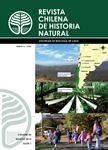 Researchers associated with Chile’s first Long-Term Socio-Ecological Research Network, coordinated by the Institute of Ecology and Biodiversity and 5 associated universities and 2 private non-profit organizations, recently launched a special edition of the Revista Chilena de Historia Natural with invited contributions from Chile, Argentina, Mexico, USA and Spain to contextualize and put into value the importance of not only long-term, but integrated social-ecological studies. To enhance the impact of this work, the editors also produced the volume in English and Spanish (click on the original article or the translation as “Material Complementario”). See the journal page to read these important contributions to the debate about LTSER in Chile, the Southern Cone and the world.
Researchers associated with Chile’s first Long-Term Socio-Ecological Research Network, coordinated by the Institute of Ecology and Biodiversity and 5 associated universities and 2 private non-profit organizations, recently launched a special edition of the Revista Chilena de Historia Natural with invited contributions from Chile, Argentina, Mexico, USA and Spain to contextualize and put into value the importance of not only long-term, but integrated social-ecological studies. To enhance the impact of this work, the editors also produced the volume in English and Spanish (click on the original article or the translation as “Material Complementario”). See the journal page to read these important contributions to the debate about LTSER in Chile, the Southern Cone and the world.
Monthly Archives: June 2010
Omora Ethnobotanical Park (Cape Horn) and Charles Darwin Station (Galapagos) Sign Collaborative Agreement
During a visit to the Galapagos Islands, financed by an INNOVA-CORFO Project entitled “Ecotourism with a Hand Lens in the Subantarctic Region,” representatives from the academic and tourism sectors from southern Chile and the U.S. held various meetings in Ecuador with the Pontifical Catholic University of Ecuador (PUCE), the International Union for the Conservation of Nature (IUCN), the Regional Office of UNESCO, the Charles Darwin Foundation (CDF) and authorities from the Galapagos National Park and tourism industry.
Dr. Francisca Massardo, director of the CORFO project, commented that the goal of these work sessions was “to learn the experience gained in the Galapagos by the Charles Darwin Station and the National Park in topics of ecotourism, since they have been going down this road for 50 years and as archipelagic regions confront some of the same challenges, such as invasive species.
In the delegation, participating researchers came from the Universidad de Magallanes (UMAG) and the University of North Texas (UNT) included Andrés Mansilla (UMAG), Francisca Massardo (UMAG/Omora), Ricardo Rozzi (UNT/UMAG), Christopher Anderson (UNT/UMAG), Jim Kennedy (UNT), economist Eduardo Camelio (Fundación Omora), and tourism entrepreneur Nicolás Pivcevic (Lakutaia Lodge), the Vice-President for the IUCN Commission on Protected Areas Eduard Mueller, and civil engineer Andrés Marin (Omora).
As a result of these conversations, several agreements were reached, including the establishment of an exchange of experiences and professionals between the Tourism Program at the PUCE and the UMAG. According to Dr. Andres Mansilla, Director of Research and Graduate Programs at the UMAG, “we will work together with the Masters of Conservation Biology at PUCE and the Masters of Science with Mention in Management and Conservation of Natural Resources in Subantarctic Environments at UMAG to address in a first phase collaborations in courses of mutual interest, using tools such as videoconference or the revision of projects and theses.”
At the same time, a cooperative agreement was signed between the Omora Ethnobotanical Park and the Charles Darwin Scientific Station with the principle objective of carrying out actions that support conservation and sustainability of the Galapagos (Ecuador) and Cape Horn (Chile) Archipelagos.
During the signing of the agreement, Dr. Gabriel López, Executive Director CDF, commented “the inter-institutional cooperative agreement between both organizations will put into place a series of joint collaborations and in the future projects on various fronts, which will generate information between both countries that serves to support conservation in these fragile ecosystems, like the Galapagos and the Cape Horn Biosphere Reserve.”
For his part, Dr. Ricardo Rozzi, Director of the Omora Ethnobotanical Park, underlined the importance of this collaboration: “For us, it is very valuable to count on the experience and assistance of the CDF for the protection and conservation of ecosystems that are as fragile as the Galapagos Islands and with a high degree of similarity with what exists in Cape Horn, where we also work to achieve the conservation of biodiversity and sustainability.”
This bi-institutional agreement is of utmost importance, given that it will involve collective work in various spheres, achieving in this way the exchange and technical support for concrete actions that favor the well-being and conservation of areas as relevant for the Cape Horn Archipelago as invasive species, the training of ecotourism guides and the implementation of policies for protected areas to mitigate potential negative effects of the tourism industry.
